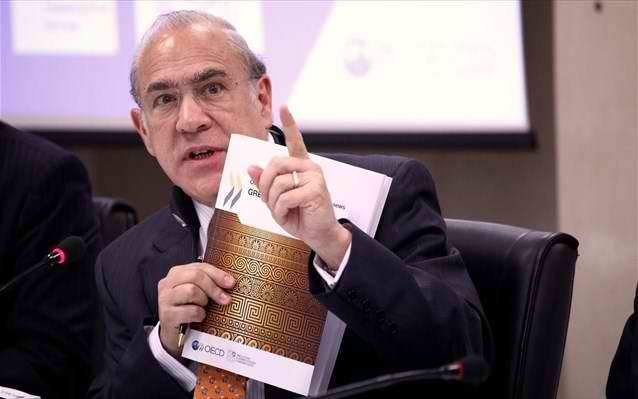In its report presented yesterday by Secretary-General Angel Gurría, the Organisation for Economic Cooperation and Development (OECD) recommends liberalisation of the market in four main sectors of the Greek economy.
The report, which analyzes the problems in the sectors of retail, food, tourism and construction materials, provides that, if adopted, the proposals of its compilers would bring to the Greek economy an annual profit in the range of 5.2 billion euro or a 2.5% increase to GDP.

OECD Secretary-General Angel Gurría
The OECD survey commissioned by the Greek Ministry of Development against the sum of 930,000 euro sets 329 significant and not so significant problems that negatively affect the competitiveness of these sectors, aggravating, at the same time, the situation of consumers.
The survey suggests a solution to every problem, namely through the full liberalisation of the market.
Such proposals and attempts have been made in the past but, reasonably or not, the interested parties in each sector responded to them.
The immediate changes proposed include changing the term for the sale of fresh milk, allowing the sale of medicines without prescription in supermarkets, permitting all shops, regardless of their size, to open on Sundays, removing the restrictions on construction of hotels.
The report proposes changes in the market of bread and bakery products, cement and cruises as well.
Critical two-month period for changes
According to Minister of Development Kostis Hatzidakis, immediate attempts will be made to solve the problems in the areas under his supervision as well as to take, within the next two months, the appropriate measures to eliminate them.
The goal is to adopt 80% of the proposals of the OECD as stated by the Minister. Regarding the areas that are not under his supervision, Hatzidakis stressed that he is in constant contact with his colleagues so that the proposals of the organisation be implemented.
Presenting the OECD study, Angel Gurría said that a similar study had been commissioned by Australia which has subsequently achieved a significant increase in the GDP.
He also stressed that "the Greek economy is in a stage of recovery and we believe that, by this time next year, it will be able to take the path of development which will continue until the end of 2015. We believe that we have already embarked on this path. The first goal has been achieved and now, there are some specific issues related to the total debt and to the reports that have to be submitted in order to achieve certain goals. In fact, I mean an impressive number of issues that we have to track and solve."
According to the OECD, 1,053 pieces of legislation were examined for the preparation of the report, making it clear that 555 regulations are restrictive or that they adversely affect competition. Therefore, 329 proposals have been submitted for removing the limitations established in these four areas of the economy that, in 2011, constituted 21% of GDP and 27% of total employment.
In addition, the report states that if the proposals are fully implemented, the Greek economy will benefit from the results in the long run as they will offer consumers a wider variety of goods, diversity, lower prices, increased productivity and, ultimately, greater economic development.
The main proposals
The main proposals of the compilers of the report are as follows:
* Full liberalisation of the pricing and sale of hundreds of medicines that are available without prescription so that they can be sold in supermarkets, following the example of vitamins and food supplements whose sale in supermarkets has been recently permitted by a decision of the Ministers of Health and Development.
It is expected that this change will provoke strong reactions on the part of the pharmaceutical industry, as it would lead to the transfer of turnovers of hundreds of millions of euro to supermarkets.
With regard to pharmacies, the OECD also recommends full liberalisation of the opening hours of pharmacies, elimination of the maximum number of licences, etc.
* Cancelling the 5-day maximum period for the sale of fresh milk, which is in force in Greece alone. This will enable the dairy companies to sell their products with a shelf life of 1 to 10 days, depending on the method of pasteurisation.
This will unblock the importation of fresh milk, which is currently impossible due to the insufficient time.
This issue is also about to provoke a response from both the Greek dairy companies and the manufacturers.
* Revising the legal framework for bread production and sale. The weight of loaves of bread will be checked and set at 1 kg, thus preventing the sale of pieces of bread, at the bakeries, that can weigh a lot less than what is paid by the consumer.
* Full liberalisation of Sunday working hours for all commercial sites (shops, malls, etc.) rather than just for those with an area of less than 250 square metres, in order to enhance competition and create 30,000 new jobs.
This issue was resolved a few months ago when the Ministry of Development opposed the opening on Sundays of shops with an area of over 250 square metres. However, it is possible that the matter be discussed again under the excuse that the OECD has suggested it.
* Liberalisation of the percentage of discount on new books, which is now set at 10%.
* Lifting the ban on stock shops and outlets to offer discounts.